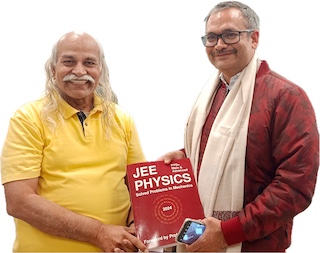Simple Pendulum
A simple pendulum consists of a small, massive object (known as the "bob") suspended by a light, flexible string. When the bob is pulled to one side and released, it executes simple harmonic motion. The time period of a simple pendulum of string length $l$ is given by \begin{align} T=\frac{1}{2\pi}\sqrt{\frac{l}{g}}, \end{align} where $g$ is the acceleration due to gravity. This formula is valid for small angular displacement $\theta$.
The angular displacement of a simple pendulum varies with time $t$ as \begin{align} \theta=\theta_0\sin\omega t, \end{align} where $\theta_0$ is the maximum angular displacement. The angular frequency is given by \begin{align} \omega=\frac{2\pi}{T}=\sqrt{\frac{g}{l}}. \end{align}
Problems from IIT JEE
Problem (JEE Mains 2021): $T_0$ is the time period of a simple pendulum at a place. If the length of the pendulum is reduced to $1/16$ times of its initial value, the modified time period is
- $4T_0$
- $T_0/4$
- $8\pi T_0$
- $T_0$
Problem (JEE Mains 2002): A child swinging on a swing in sitting position, stands up, then the time period of the swing will
- increase
- decrease
- remains same
- increases if the child is tall and decreases if the child is short
Problem (JEE Mains 2020): A simple pendulum is being used to determine the value of gravitational acceleration $g$ at a certain place. The length of the pendulum is 25.0 cm and a stop watch with 1 s resolution measures the time taken for 40 oscillations to be 50 s. The accuracy in $g$ is
- 2.40%
- 5.40%
- 4.40%
- 3.40%
Solution: The recorded length of the pendulum is $l=25.0$ cm. It also indicates the accuracy of the measuring scale, which is 0.1 cm. Thus, error in length is $\Delta l=0.1$ cm.
The time for $n=40$ oscillations is $T^\prime=nT=50$ s. The error in $T^\prime$ is $\Delta T^\prime=1$ s (stop-watch's resolution).
The acceleration due to gravity is given by \begin{align} g&=\frac{4\pi^2l}{T^2} \\ &=\frac{4\pi^2 n^2 l}{(nT)^2} \\ &=\frac{4\pi^2 n^2 l}{{T^\prime}^2}.\nonumber \end{align} Differentiate and simplify to get, \begin{align} \frac{\Delta g}{g}&=\frac{\Delta l}{l}+2\frac{\Delta T^\prime}{T^\prime} \\ &=\frac{0.1}{25}+2\;\frac{1}{50}=4.4\%.\nonumber \end{align}
